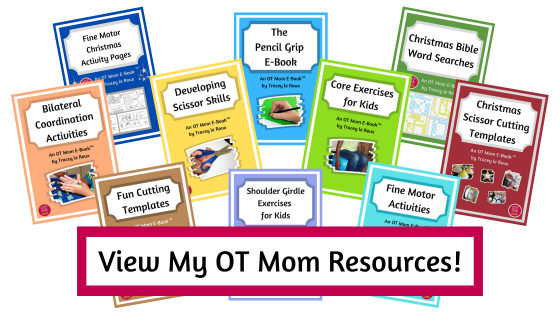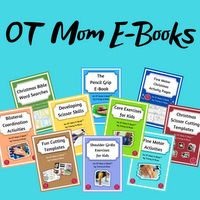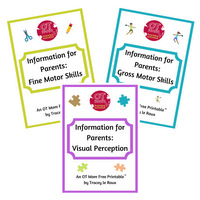- Home Page
- Gross Motor Skills Explained
- Gross Motor Activities And School Readiness
Preschool Gross Motor Activities
and School Readiness
Preschool gross motor activities should be an important part of your child's routine, as they help build the foundation skills needed for learning.
I sometimes link to products (#Ad) that are similar to those I use and love. If you do purchase something through my links, I will receive a small commission that helps support my site - thank you!
Developing your child's gross motor skills is so much more than helping your child be good at sports. Having a good gross motor foundation can influence your child’s ability to write well, to read well and even to concentrate in the classroom. School readiness activities should always include lots of gross motor activities.
This page takes a look at some of the skills your child needs to be ready for school, and then links out to pages on my website which will give you the fun, free activities you need to help your child!
- Being able to sit at a desk to work
- Listening and following instructions
- Copying work from the board
- Scissor cutting, drawing and coloring skills
- Handwriting
- Correctly spacing written work on the page
- Learning to read
- Reinforcing basic math skills
- Ideas for preschool gross motor activities
- Free printable gross motor download!

Being Able To Sit At A Desk To Work
Starting formal schooling means your child needs to be able to sit at a desk or table for extended periods of time - without slouching or lying all over the desk.
Being able to comfortably sit at a desk also means your child can concentrate on the lesson, instead of focusing on staying upright!
 Sitting at a desk requires core stability
Sitting at a desk requires core stabilityYour child needs to have a strong, stable core (the trunk and back muscles) as well as endurance - these can be developed through taking part in gross motor activities.
- Check out my page of simple core exercises for kids for some fun ideas to do at home!
Listening To The Teacher And Following Instructions
A really important school readiness skill is the ability to listen and then follow instructions.
- Taking part in sports, games, and other preschool gross motor activities, with or without other children, can help your child to learn these important skills.
- Getting your child involved in chores around the house is a great way to help them learn to follow instructions. Check out my page of chores that help develop gross motor skills, and see how much they can benefit!
Copying Work From The Board
Copying work from the blackboard requires your child to visually focus on the work on the board, and transfer focus from near to far and back again.
- Playing ball games can help develop these functional visual skills
- Even climbing a tree or jungle gym is helpful, as your child focuses on where his/her hand or foot is and then focuses on where the next hand grip or foothold will be
 Visually focusing on the ball
Visually focusing on the ball Visually focusing on where to go next
Visually focusing on where to go nextScissor Cutting, Drawing and Coloring Skills
School readiness activities often include scissor cutting, drawing and tracing activities.
However, in order to use the small muscles of the hands to hold a pencil or manipulate scissors, the large muscles of the arms, shoulder and trunk need to be strong and stable.
Preschool gross motor activities should target these areas.
 Fine motor skills require core and shoulder stability
Fine motor skills require core and shoulder stability- There are lots of simple, free core exercises and shoulder girdle exercises on my site that you can try.
- These easy bilateral coordination activities may also help your child to coordinate the hands to use scissors properly.
Developing Good Handwriting Skills
In order to master handwriting, your child needs to be able to use the hands and eyes well together, a skill called visual-motor integration.
This means that the eyes guide the hands in controlling the pencil so that the correct shapes and lines can be made to create the letters.
 Handwriting requires visual-motor-integration
Handwriting requires visual-motor-integration- You can help your preschool child develop visual motor integration skills with these free hand-eye coordination games.
- I also have a page full of free suggestions for using everyday objects and regular toys to develop visual motor skills.
Correctly Spacing Written Work On The Page
In order for your child to correctly space out the written work on the page, crossing the midline and directionality skills need to be well established, as well as spatial perception and planning skills.
Giving your preschool child lots of gross motor opportunities can help your child develop these skills while moving around, changing direction, and planning how to use equipment.
- Playing at the park can work on all these areas as your child navigates playground equipment.
- Try making an obstacle course at home where your child has to go over, under and through objects to develop spatial awareness skills.
- Play "Follow-my-leader", and let your child be both the follower and the leader to develop motor planning and spatial awareness.
- Check out my page of free midline crossing activities.
Learning To Read
Learning to read is a big part of formal schooling, and the emphasis is often on learning to recognize letters and developing phonetic awareness.
However, your child needs good visual tracking and visual focusing skills in order to learn to read.
The eyes need to focus on the letters and words and then track them smoothly across the page.
 Learning to read
Learning to readSchool readiness activities should therefore include lots of opportunities for your child to visually focus on objects and track them during gross motor games and activities.
- I have a page of fun and easy games and activities with bean bags - these can help develop functional visual skills.
- My visual motor and eye-hand coordination pages will also give you lots of ideas you can do at home.
Reinforcing Basic Math Skills
Many preschool gross motor activities can be adapted to include rhythmical counting, which can help your child internalize number sequences.
- Encourage your child to count jumps and throws, or assign them a certain number to do - it takes a lot of control to stop at jump number 10 on a trampoline!
 Counting while tossing
Counting while tossing- You can also include number recognition in games such as hopscotch and target tossing.
- Introduce skip counting in 2's and 5's and 10's as your child gets older.
Ideas for Preschool Gross Motor Activities
Although many of the activities on my site are geared to children in kindergarten and first grade, most of them can easily be used by preschoolers as they develop their skills.
In case you missed the links earlier on this page, here are are some of the free gross motor pages on my site:
- Activities for bilateral coordination skills
- Activities for hand-eye coordination skills
- Fun and easy bean bag games
- Activities and tips for crossing the midline
I hope you found this page helpful and inspiring!
If you are looking for gross motor resources that are accessible and printable, please do check out my printable gross motor resources that target particular skills.
For the price of a couple of coffees, you will have a wealth of easy activities at your fingertips !
- Home Page
- Gross Motor Skills Explained
- Gross Motor Activities And School Readiness
Share this page to help others!
Check out these gross motor posts by fellow therapists!
(Each link opens in a new tab/window and takes you to their lovely sites)
- Dinosaur Physical Therapy has an article on teaching children how to jump.
- Your Kids OT has a great idea for a color shape path - let your preschooler cut out the shapes and then use the path for a variety of gross motor activities!
Free Printable Gross Motor Download!
This free printable download helps you to understand how gross motor skills can have an impact on your child in the classroom.
It is part of a set of 3 handouts that I compiled to help parents understand how gross motor, fine motor and visual perception skills can affect your child's learning.
You will get all 3 handouts absolutely free when you sign up for my newsletter!

Didn't find what you were looking for? Try a search of my site!











